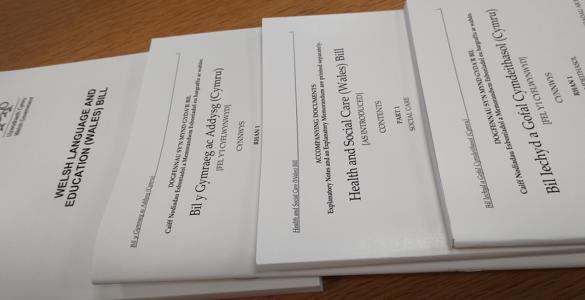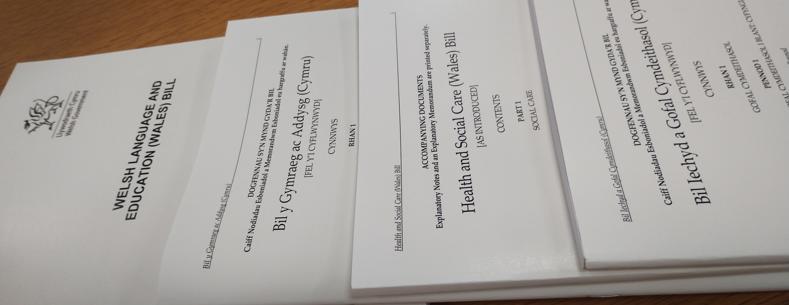This week the Welsh Government introduced the Legislation (Procedure, Publication and Repeals) (Wales) Bill.
The Bill is focused on improving the accessibility of the law and it makes some important adjustments to how legislation is published and scrutinised.
The Bill does four things:
- Codifies the procedures for Senedd scrutiny of secondary legislation;
- Formalises the way in which Welsh legislation is published;
- Repeals laws that are no longer of “practical utility or benefit”; and
- Makes minor amendments to the Legislation (Wales) Act 2019.
Improving the Accessibility of the Law
The Welsh Government is required to publish a programme at the start of every Senedd term by the Legislation (Wales) Act 2019 (“the 2019 Act”). The programme has to include activities to:
- contribute towards consolidating and codifying Welsh law;
- maintain the form of Welsh law;
- promote awareness and understanding of Welsh law; and
- facilitate the use of the Welsh language.
It can also include collaborative work with the Law Commission and any other matters that the Welsh Government considers appropriate.
In 2021, the Welsh Government published The Future of Welsh Law, which set out the actions it would take during this Senedd term to improve the accessibility of the law in Wales. This Bill is the latest part of this programme of work.
The changes made by Parts 1 and 2 of the Bill would take effect as new Parts and Schedules to the 2019 Act.
Codifying Senedd scrutiny of secondary legislation
Much of the law made in Wales comes in the form of secondary legislation (also known as ‘subordinate’ legislation). Secondary legislation is usually made in the form of a ‘Statutory Instrument’.
Primary legislation (Acts of the Senedd or UK Parliament) often gives powers to the Welsh Ministers to make secondary legislation. This can include regulations or orders. Generally, the finer detail of how laws operate is left to secondary legislation.
The procedures for the Senedd to scrutinise this legislation originate in the Statutory Instruments Act 1946, which pre-dates devolution. While several procedures exist, the 1946 Act only details one – known as the negative procedure. The two other common procedures (draft affirmative and made affirmative) have developed through custom and practice.
Part 1 of the Bill seeks to change this by formalising these procedures into three new Senedd procedures:
- The Senedd Approval Procedure would replace the ‘draft affirmative’ procedure where the statutory instrument could only become law if it is approved by a vote in the Senedd;
- The Senedd Confirmation Procedure would replace the ‘made affirmative’ procedure meaning that the statutory instrument would become law when it is made, but it can only remain in force if it is confirmed in a vote by the Senedd within a set period of time; and
- The Senedd Annulment Procedure would replace the ‘negative procedure’ where the statutory instrument becomes law when it is made but it can be annulled by the Senedd up to 40 days after it is laid.
Formalising the publication of Welsh legislation
All legislation that is made by the UK Parliament and devolved legislatures is formally published. This is done by the Keeper of Public Records in their capacity as the King’s Printer of Acts of Parliament, the Government Printer for Northern Ireland, and the King’s Printer for Scotland.
Under the current arrangements, there is no legal basis for the Keeper of Public Records (acting as the King’s Printer of Acts of Parliament) to publish Senedd Acts. The Bill’s explanatory memorandum says that the King’s Printer undertakes this function “in practice”.
Part 2 of the Bill seeks to change this by requiring the King’s Printer to publish Senedd Acts, including a formalised process for how they are to be numbered.
The Bill also seeks to make changes to the way in which Welsh secondary legislation is published and recorded. Currently, there is no legal concept of a ‘Welsh Statutory Instrument’ in a similar way that there is for secondary legislation made by the Scottish Ministers or Northern Ireland Executive. Instead, subordinate legislation made by the Welsh Ministers forms part of a subset of UK statutory instruments. The Bill seeks to change this by providing a legal basis for the concept of a ‘Welsh Statutory Instrument’.
‘Decluttering’ the statue book
Part 3 of the Bill seeks to remove redundant laws that the explanatory memorandum says are “no longer of practical utility or benefit”. Repeal Bills of this type are common in the UK Parliament, and have often been developed in collaboration with the Law Commission. The Bill’s explanatory memorandum says that repeal Bills help to:
improve the accessibility of Welsh law by modernising and simplifying the law, reducing the size of the statute book and making it easier to navigate.
This Part of the Bill introduces a Schedule that repeals parts of 60 different pieces of legislation. A lot of this legislation is related to planning law that the Welsh Government sees as “redundant”, as well as defunct bodies such as Rural Development Boards and the Welsh Development Agency.
The Bill would also repeal in their entirety two pieces of primary legislation passed by the Senedd. The first of these – the Domestic Fire Safety (Wales) Measure 2011 – the Welsh Government says is no longer needed because Welsh Ministers now have the power to make equivalent changes by amending Building Regulations. The second – the Welsh Elections (Coronavirus) Act 2021 – only applied to a specific time period that has now passed, so the Act is now “entirely spent”.
Most of the proposals for repeal were consulted on by the Welsh Government in a Draft Statute Law (Repeals) (Wales) Bill in 2022.
Amendments to the Legislation (Wales) Act 2019
Part 4 of the Bill makes amendments (outlined in Schedule 2 of the Bill) to the Legislation (Wales) Act 2019 as a result of a review of the Act undertaken by the Welsh Government last year. This review found that certain aspects of Part 2 of the 2019 Act could benefit from “clarification”, particularly as a result of the Welsh Government’s experience of drafting consolidation Bills. There are also minor amendments made to the 2019 Act as a result of the changes proposed by this Bill.
Senedd scrutiny of the Bill
The Bill will be subject to the normal Senedd legislative process, with the Legislation, Justice and Constitution Committee acting as the designated Committee for scrutiny of the Bill’s general principles.
The Committee will be taking evidence from the Welsh Government and stakeholders over the coming months, before reporting on its findings early next year.
You can find more information about the Committee’s scrutiny of the Bill on the Senedd website.
Article by Josh Hayman and Adam Cooke, Senedd Research, Welsh Parliament






